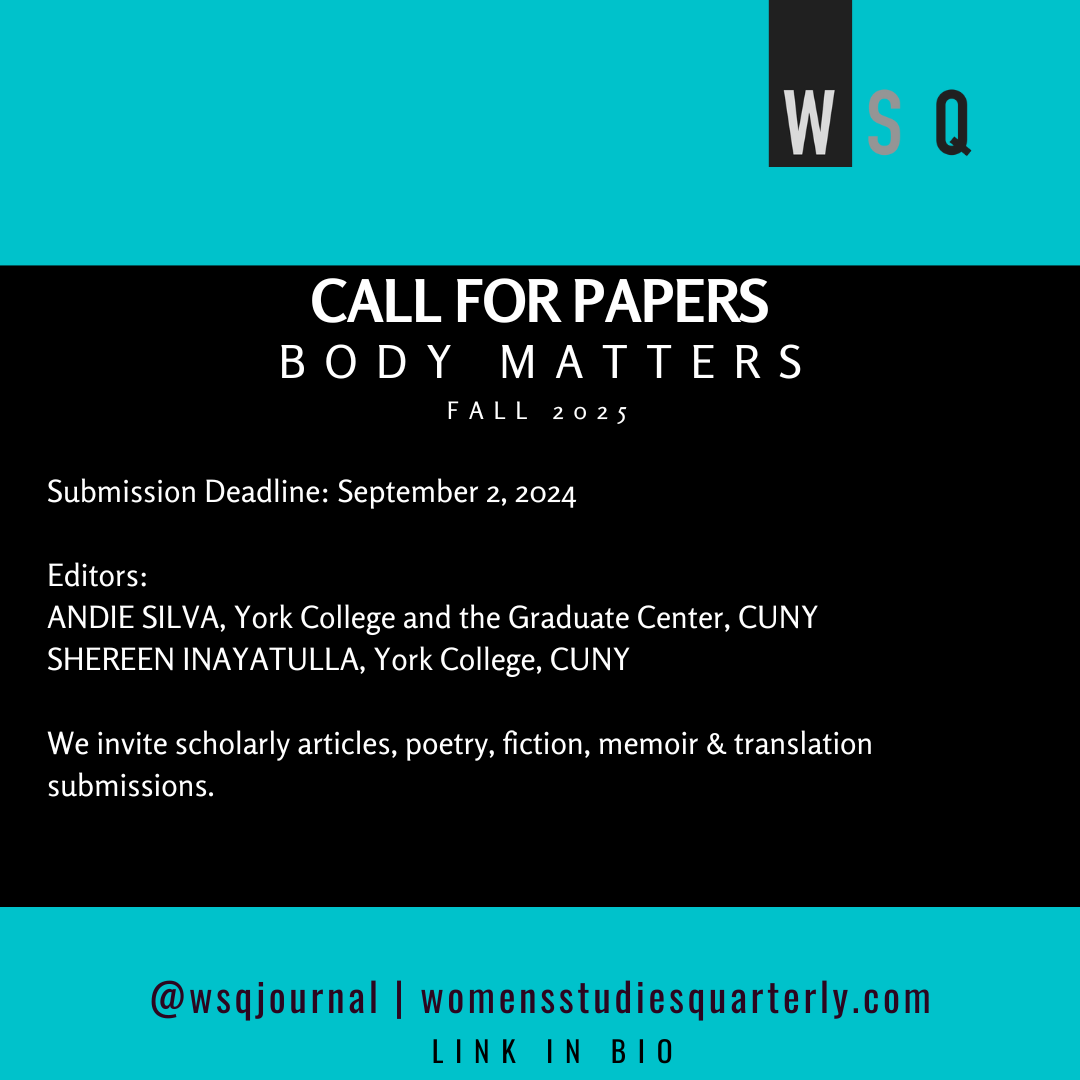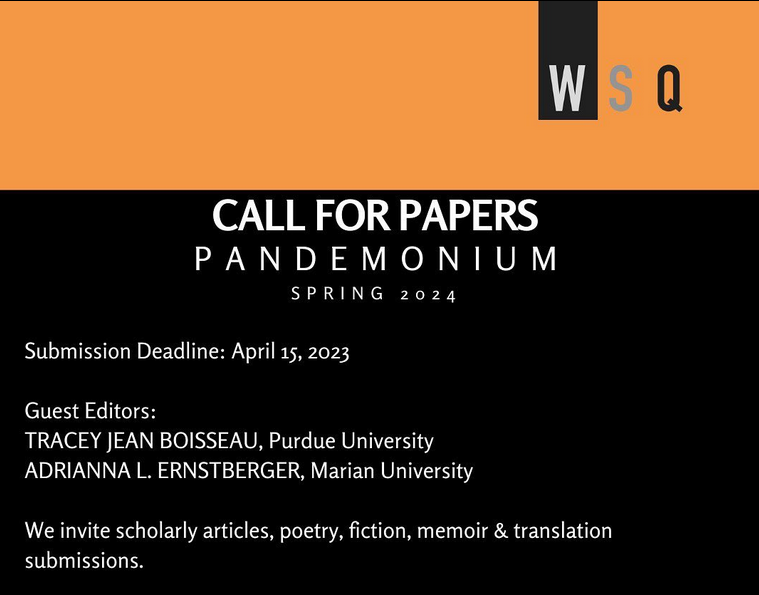
We invite submissions of poetry, prose, visual art and other creative media for WSQ: Pandemonium.
This special issue of Women’s Studies Quarterly invites reflection on the status, health, precarity, and promise of the discipline of women’s, gender, sexuality and feminist studies in light of ourcurrent state of pandemonium.
By “pandemonium,” we point not only to those tragedies, inequalities, and disruptions to the university and higher education stemming directly from the Covid-19 pandemic, but also the crisis-roiled political context fomenting a barrage of assaults on feminist studies as a discipline in the U.S. and elsewhere that have been accelerating for several years prior to the pandemic and have only intensified since its outbreak.
We seek submissions from a diverse group of feminist-studies scholars, researchers, teachers, administrators, practitioners, intellectuals, artists, advocates, writers and leaders, drawing on their research as well as personal experiences, that reveal and analyze the effects of a kaleidoscopic set of conflicts, crises, and pressures affecting their lives, scholarship, work, teaching, career, institutions, and political organizing, particularly those that are a sign of or hold consequences for the health and survival of the discipline of feminist studies as a whole.
The key elements of “pandemonium” we refer to, beyond those most directly pandemic-related, hinge on decades of neo liberal policy making pushing privatization and commercialization of education. Such policies, in the face of genuine economic crises stemming from the pandemic, as well as “natural” disasters and population dislocations caused by warfare and accelerating climate change, have been used to justify the implementation of so-called “austerity” measures that have hit nontechnical and especially advocacy fields such as feminist studies the hardest. At the same time, concerted rightwing and authoritarian movements have put feminists as well as women, queer, trans and non-binary folk, immigrants, refugees, and people of color in their crosshairs. The U.S. is seeing unprecedented attacks on liberal democratic institutions, escalating “culture wars,” the dismantling of women’s rights and reproductive justice (e.g. the Dobbs decision), as well as increased anti-trans hysteria and anti-intellectual vitriol specifically targeting feminist and anti-racist educators and scholars. Across the globe—in Afghanistan, Argentina, Brazil, Croatia, France, Haiti, Hungary, Nicaragua, Nigeria, Pakistan, the Philippines, Poland, Russia, South Africa, South Korea, Sweden, Turkey, Uganda, the U.K., and elsewhere—emergent anti-feminist, nativist, and white-supremacist political parties as well as established autocratic and authoritarian regimes have instituted blatantly misogynistic, anti-queer, anti-trans, racist, and anti-immigrant legislation, often accompanied by governmental and extra-governmental policies explicitly intended to marginalize, erase, suppress, or extinguish feminist studies as a legitimate academic discipline and teaching field.
Pandemonium creates space for feminist-studies practitioners to consider the tumultuous circumstances we find ourselves in, to document and reflect on recent experiences, and to draw conclusions about the current state—and possible future—of our field. In that spirit, we offer this special issue as a site not only for identifying and assessing existential threats and proliferating crises but also as an opportunity to recognize promising strategies and praxes of resistance that may illuminate new pathways through the pandemonium of our moment, hopefully leading to a stronger future for our discipline.
Submissions should address ways our discipline—its individual practitioners as well as organizations and institutions—have been affected by, or have encountered adversity and experienced struggle in the face of:
· The Global Pandemic and a panoply of consequences flowing from it
· Rightwing (white supremacist, anti-immigrant, anti-queer/trans, misogynist, etc.) movements
· Rightwing corporate media and social media
· Authoritarianism, illiberalism, and threats to democratic institutions
· War, invasion, civil strife, and refugee-ism
· Neoliberalism, corporatism, and commercialization of education
· Climate-change disasters, environmental degradation, and climate-change denial
· Impoverishment and the “austerity” measures and policies arising from the above
We are keenly interested in contributions that document and evaluate the ways that our discipline and its practitioners exercise and exhibit resistance, revolutionary praxis, and refusal to the above in the form of:
· Scholarly, pedagogical, and administrative strategizing
· Organizational-, institutional- and alliance-building (both inter- as well as intra-disciplinary)
· Public engagement, political activism, and direct action (both on-campus and off)
· Escape hatches, off-ramps, alternative social-cultural protest forms and modalities
We welcome contributions that recognize and share artistic and creative endeavors, performances, and cultural interventions offering insight and inspiration regarding the core themes of this issue
Especially encouraged to submit are women; people of color; Black; Indigenous; gender-variant, LGBTQIA+; disabled people; and those whose work is located outside the United States or who collaborate cross-nationally.
WSQ SUBMISSION GUIDELINES
- Artistic works (whose content relates clearly to the issue theme) such as creative prose (fiction, essay, memoir, and translation submissions between 2,000 and 2,500 words), poetry, and other forms of visual or documentation of performative artistry should be submitted to WSQ.submittable.com. Before submitting, please review previous issues of WSQ to see what type of creative submissions we prefer. Note that creative submissions may be held for six months or longer. We do not accept work that has been previously published. (Simultaneous submissions are acceptable if the editors are notified immediately of acceptance elsewhere.) For questions related to creative submissions, email [email protected].
- Scholarly articles should be submitted to WSQ.submittable.com. Send complete articles, not abstracts. Remove all identifying authorial information from the file uploaded to Submittable.. Scholarly submissions must not exceed 6,000 words (including un-embedded notes and works cited) and must comply with formatting guidelines at https://www.feministpress.org/submission-guidelines. For questions, email the guest issue editors at [email protected].


